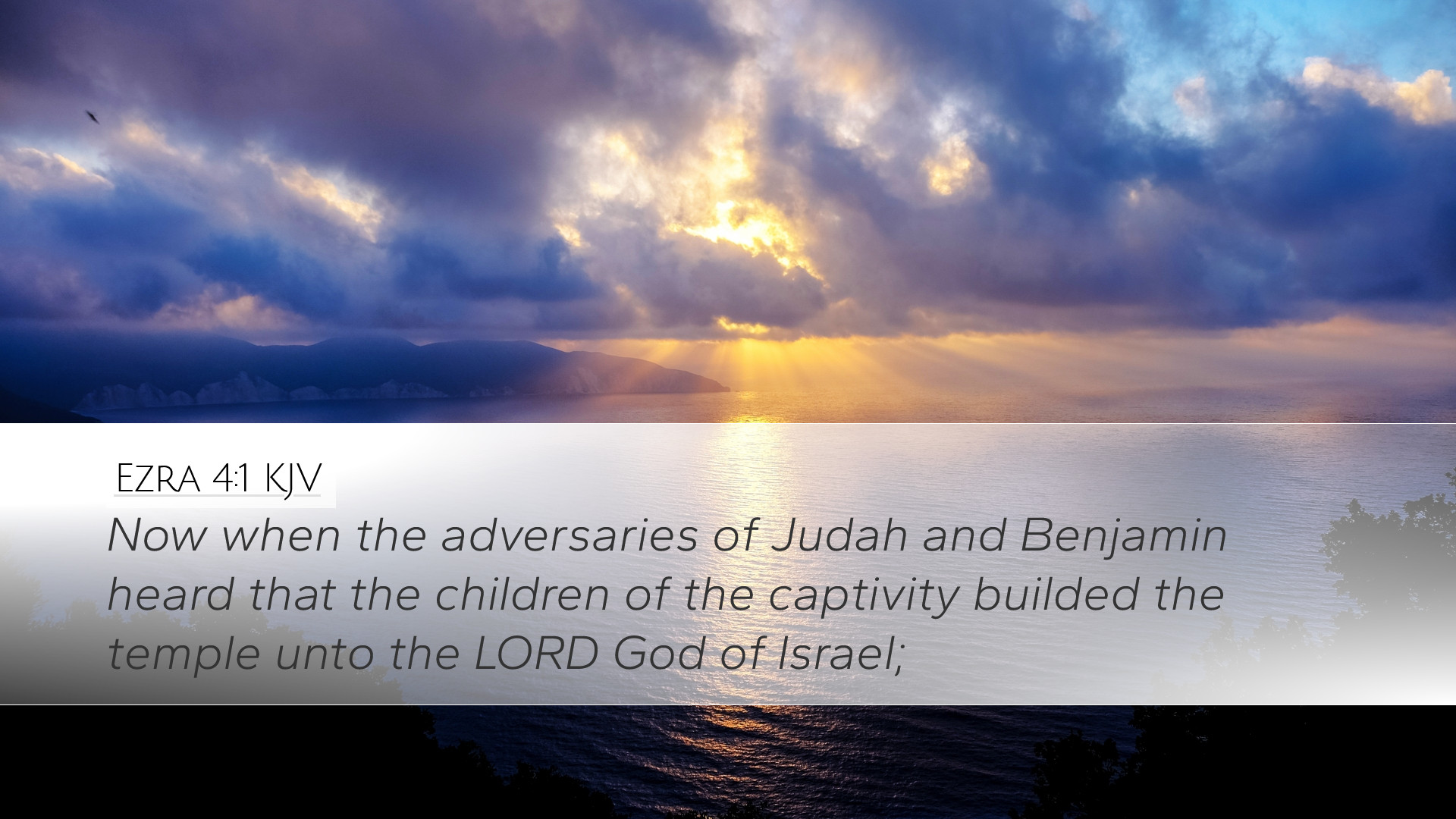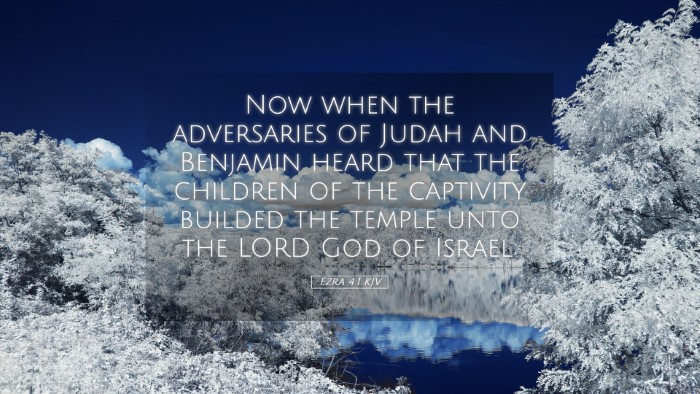Old Testament
Genesis Exodus Leviticus Numbers Deuteronomy Joshua Judges Ruth 1 Samuel 2 Samuel 1 Kings 2 Kings 1 Chronicles 2 Chronicles Ezra Nehemiah Esther Job Psalms Proverbs Ecclesiastes Song of Solomon Isaiah Jeremiah Lamentations Ezekiel Daniel Hosea Joel Amos Obadiah Jonah Micah Nahum Habakkuk Zephaniah Haggai Zechariah MalachiEzra 4:1
Ezra 4:1 KJV
Now when the adversaries of Judah and Benjamin heard that the children of the captivity builded the temple unto the LORD God of Israel;
Ezra 4:1 Bible Commentary
Commentary on Ezra 4:1
Introduction: Ezra 4:1 presents a pivotal moment in the narrative of the restoration of the Jewish people post-exile. The verse encapsulates the challenges faced by those attempting to rebuild the temple and re-establish their community in Jerusalem. This commentary synthesizes insights from respected public domain commentators, analyzing the historical and theological implications of this verse.
Verse Text
“Now when the adversaries of Judah and Benjamin heard that the children of the captivity builded the temple unto the Lord God of Israel,” (Ezra 4:1, KJV).
Contextual Background
The book of Ezra begins after the Babylonian captivity, detailing the return of the Jewish exiles and their efforts to rebuild Jerusalem and the temple. This verse introduces the opposition that arose as they sought to fulfill God’s commandment to rebuild His house.
Insights from Matthew Henry
Matthew Henry emphasizes the significance of the adversaries mentioned in this verse. He notes that the phrase "adversaries of Judah and Benjamin" suggests a collective opposition that was not just political but also spiritual in nature. Henry points out:
- The adversaries were likely locals who felt threatened by the return of the Jewish exiles and their intent to restore their religious practices.
- He draws parallels to the challenges faced by Christians today, suggesting that opposition should be expected when undertaking God’s work.
- Henry also remarks on the theological implications of rebuilding the temple. He emphasizes that it represents a divine mandate, and any act against it is an act against God Himself.
Insights from Albert Barnes
Albert Barnes provides a detailed examination of the opposition faced by the returning exiles. He highlights several important points:
- Barnes identifies the adversaries as the Samaritans and other inhabitants of the land who had settled there during the exile. Their opposition was not only due to a desire to protect their economic interests but also to preserve their religious influences.
- He discusses the nature of their opposition, noting that it likely stemmed from a mixture of jealousy and fear of losing their own power and prestige.
- Barnes further emphasizes the importance of understanding the cultural and political dynamics prevalent at the time. He suggests that these dynamics played a significant role in the history and narrative of the Jewish people.
Insights from Adam Clarke
Adam Clarke offers a more extensive historical analysis of the circumstances surrounding this verse. His insights include:
- Clarke observes the broader context of the opposition, reinforcing that the enemies of Judah and Benjamin were part of a larger geopolitical struggle in the region.
- He highlights how their animosity was not only toward the physical act of rebuilding the temple but also toward restoring the worship and covenant relationship of the Jewish people with God.
- Clarke suggests that the reaction of the adversaries is indicative of a spiritual conflict, reminding readers that the enemies of God’s work have often used various means to obstruct His plans.
Theological Implications
The adversarial forces that arise against the children of Israel in Ezra 4:1 serve as a cautionary reminder of the spiritual warfare that believers face. This theme is echoed throughout Scripture, where the intention to obey God often encounters resistance.
- Spiritual Warfare: The opposition serves as an illustration of the spiritual battles that continue within the Christian community. Paul reminds the Church in Ephesians 6:12 that we do not wrestle against flesh and blood but against spiritual forces of evil.
- The Call to Perseverance: The reactions to the rebuilding effort symbolize the importance of steadfastness in faith. Just as the exiles were called to continue their work despite opposition, so too are modern believers encouraged to persevere in the face of trials.
- God’s Sovereignty: Despite the opposition, the narrative of Ezra reinforces the belief in God’s sovereignty over His covenant people. The establishment of the temple serves not only as a physical structure but as a testament to God's faithfulness and His promises to Israel.
Application for Pastors and Theologians
From this verse, several key applications arise for pastors and theologians:
- Encouraging Resilience: Leaders should encourage their congregations to remain resilient when facing opposition, drawing on the historical context of Ezra's time.
- Understanding Contextual Challenges: It is crucial for church leaders to understand the dynamics of local and global adversities affecting their congregations, investing in relational insights akin to the historical observations made by commentators.
- Fostering a Spirit of Unity: The division and opposition faced by the Jewish exiles can serve as a reminder of the importance of unity within the body of Christ, echoing the call in Philippians to be of one mind and spirit.
Conclusion
Ezra 4:1 highlights both the difficulties and the divine purpose in the rebuilding of God’s temple. As pastors, theology students, and scholars analyze this verse, they are reminded of the enduring truths that resonate through history: God’s purposes may face challenges, but His faithfulness remains. The insights of commentators like Henry, Barnes, and Clarke provide a rich tapestry of understanding that continues to inform modern applications of this ancient text.


